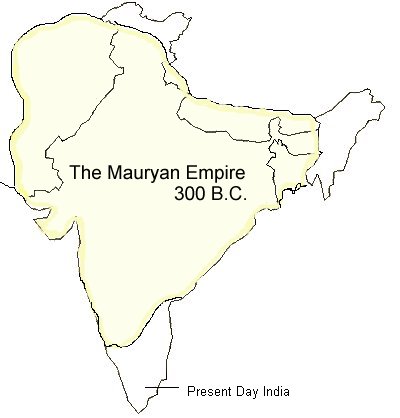The Span of the Mauryan Empire

Map Showing the Mauryan Empire - 300 B.C.
By the end of the third century BC, most of North India was knit together
in the first great Indian empire by Chandragupta Maurya. His son Bindusara extended the
Mauryan empire over virtually the entire subcontinent, giving rise to an imperial vision
that was to dominate successive centuries of political aspirations. The greatest Mauryan
emperor was Ashoka (286-231 BC) whose successful campaigns culminated in the annexation of
Kalinga (modern Orissa). Overcome by the horrors of war, he was probably the first
victorious ruler to renounce war on the battlefield. Ashoka converted to
Buddhism, but did
not impose his faith on his subjects. Instead, he tried to convert them through edicts
inscribed on rock in the local dialects, using the earliest known post-Harappan script
known as Brahmi.
The Mauryan economy was driven by agriculture. The State owned huge farms and these were
cultivated by slaves and farm laborers. Taxes were collected on land, trade and
manufacture of handicrafts were the other major sources of income during this era.
Following Ashoka's death in 232 B.C., the Mauryan empire started disintegrating. This was an
open invitation to invaders from Central Asia to seek their fortunes in India. This period
saw the rise of several smaller kingdoms which did not last very long.
See Also:
References:
- Basham A.L., The Wonder That Was India, 1954
- Kamat K. L., The Timeless Theater , 1999
- Bongard-Levin G.M., Mauryan India, 1983

